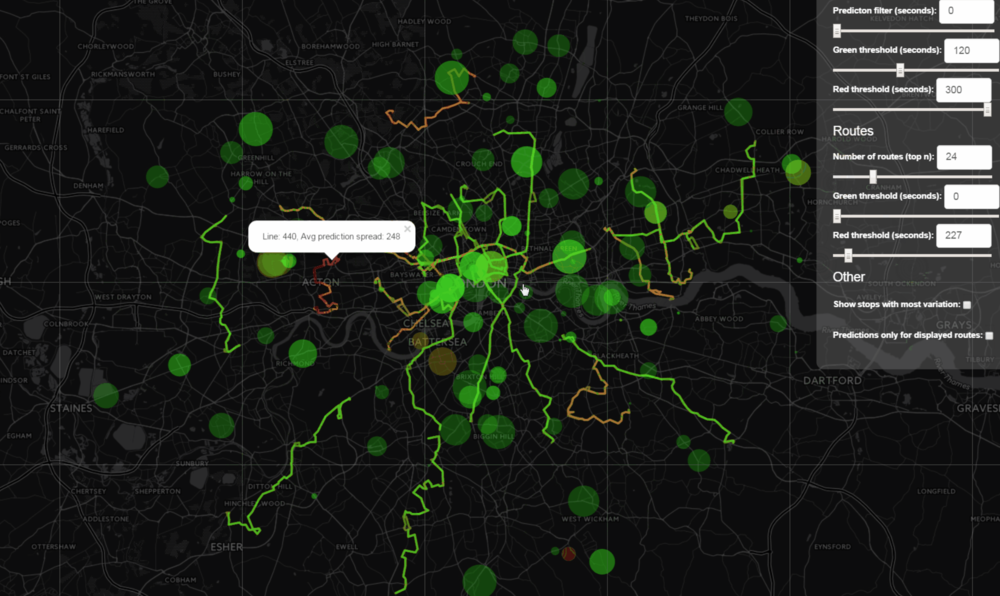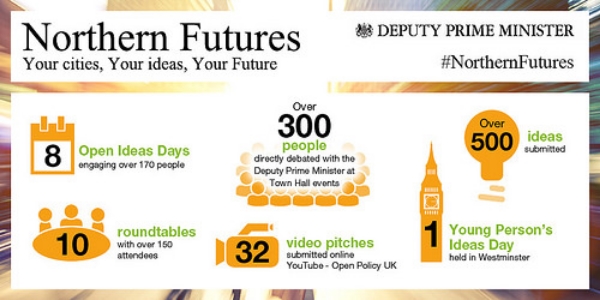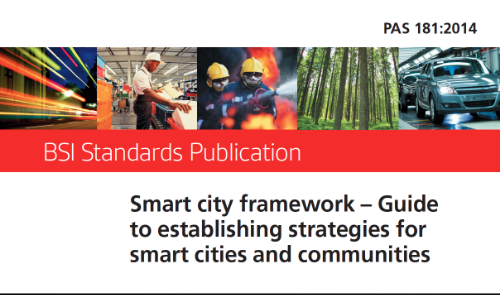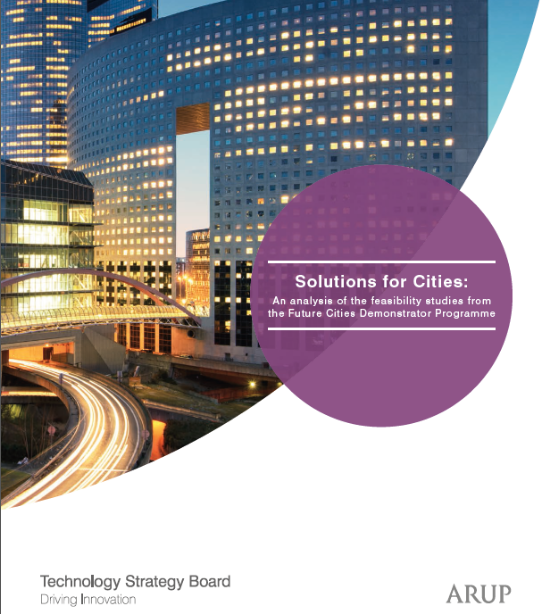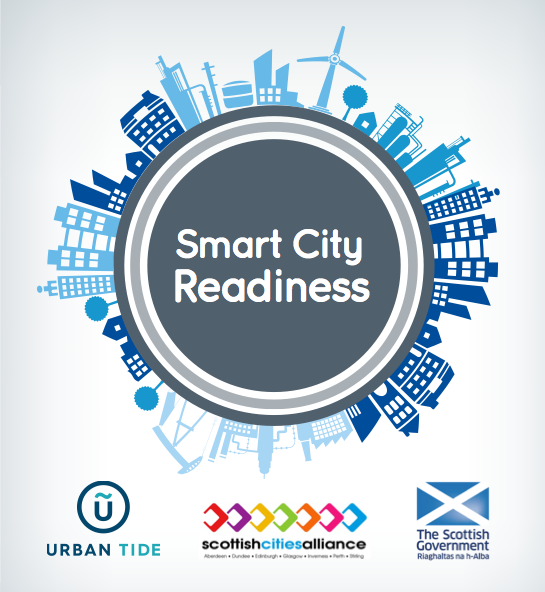Is open data the death of FOI?
The simple answer is yes, but, we know it is not as simple as that.
December 20, 2016

There is growing evidence emerging of the inefficiencies of a closed data culture in central and local government.
With this blog post we are making the case for how open data can answer some of the challenges caused by FOI (Freedom of Information Act 2000 and Freedom of Information Act (Scotland) 2002) in central and local government bodies, and how potentially going above and beyond publishing statutory information about their activities can result in short, medium and long-term benefits.
What is open data?
Globally, there is a new, different emerging approach to government transparency. One way this approach manifests itself is in open government data. Open data has many definitions, at UrbanTide we roll with Open Knowledge Foundation’s definition:
“Open data is data and content that can be freely used, modified and shared by anyone for any purpose”
Open data means the proactive publication of whole classes of information, released into the wild for use and reuse under various licenses. The Open Government Partnership Declaration calls for governments to commit to “pro-actively provide high-value information, including raw data, in a timely manner, in formats that the public can easily locate, understand and use, and in formats that facilitate reuse.”. While the International Open Data Charter, adopted by 41 governments, 16 national and 25 local/subnational governments, urges governments to open their data in digital formats by default and invest in the creation and foster a culture of openness.

Principles of the open data charter (Source)
FOI is a good step in the direction of providing citizens access to data otherwise locked into local and central governmental organisations, but we think it is not enough. When it comes to FOI requests we agree with one of our open data trainees who said that:
“Every time my organisation receives an FOI request, I consider it an organisational failure, as most of that data should already be open and available to the public.”
Numbers, numbers, numbers
In the UK over 100,000 organisations are subject to the Freedom of Information Act 2000 or the Freedom of Information Act (Scotland) 2002, including all central government bodies, local authorities and schools. The Cabinet Office publishes a quarterly statistics bulletin on FOI. This bulletin reports statistics on a total of 41 central government bodies. The statistics cover only non-routine written requests for information. Information given out on request as a part of routine business, including information released in the form of leaflets, correspondence exchanges, reports and other published material, and through websites and departmental FOI Publication Schemes are not counted.
So bearing in mind that these numbers are only from certain central governmental bodies and do not cover ALL FOI requests:
- In 2015 across all monitored bodies, 47,386 “non-routine” FoI requests were received (+1% on 2014)
- Here is a breakdown from the Cabinet Office 2015 Q4 publication:
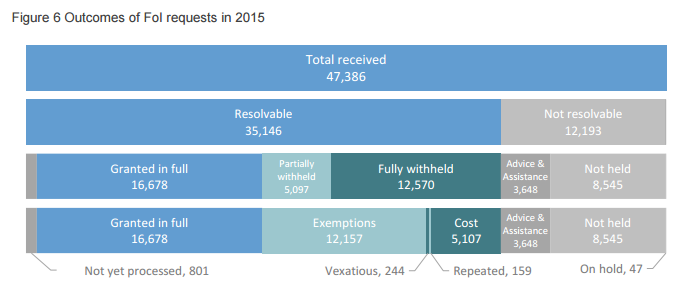
Figure breakdown from the Cabinet Office 2015 Q4 publication (Source)
- In 2005 according to an independent report published by Frontier Economics, the total cost of dealing with FOI requests across central government was £24.4 million per year.
- The report estimated that the wider public sector received at least 87,000 FOI requests annually. This was more than twice the number handled by central government in 2005.
- Frontier Economics estimated the cost of handling these requests to be £11.1 million per year.
- Local authorities are estimated to have the highest volume of FOI requests outside central government, receiving around 60,000 per year at a cost of £8 million. It should be noted that the cost estimates above represent the full costs of dealing with requests for information - they do not reflect the additional costs of implementing the FOI legislation.
- The average (hourly) cost of officials’ time in responding to FOI requests within central government was £34 in 2005. It took on average 7.5 hrs to deal with a request which means that the average cost of officials’ time for an initial FOI request was approximately £254 in central government.
So just to recap in 2005 in the UK:
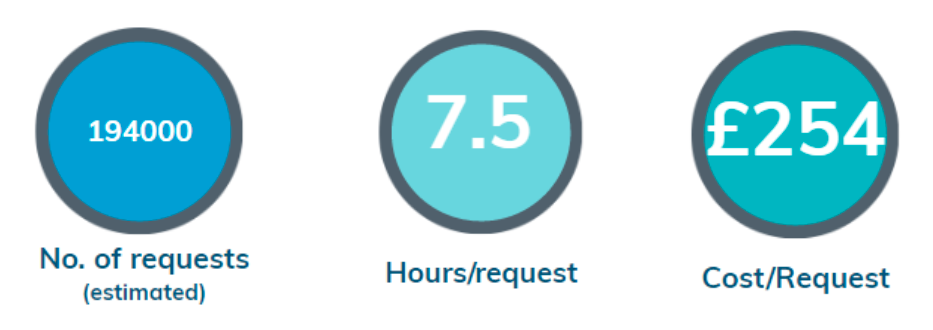
FOI requests in Scotland
An FOI costing exercise carried out by the Scottish Government in 2009-2010 collected information on the amount of staff time taken responding to requests for 186 out of the 253 cases registered during the nine-week survey period by the core Scottish Government and those agencies with access to the Scottish Government’s Information Request Tracker.

On average it took a little over 7 hours to respond to a request with a £189 average cost. These numbers are excluding FOI Unit staff time and costs.
How can open data help? (Show me the money!)
The information that can be released under the FOI Acts is public knowledge, so why not publish it pro-actively online, accessible to all? Very often a lot of organisations we talk to don’t realise that they are already publishing data - they already have certain open datasets on their website, so why not do more?
Examples, with tangible numbers, on the direct impact of open data on public sector organisation’s operations and local government budgets are scarce. There are however, a few very good case studies that show the advantages of open data:
- In Carlisle, publication of real-time business rates has significantly reduced the number of FOI requests, improving the process for local businesses and saving the council up to £15,000 annually. (Source)
- Windsor and Maidenhead Council decided to publish real-time data on energy use in public buildings in 2015 which helped them to cut their energy bills by 16%. (Source)
- In 2009-2010 FOI requests were estimated to cost the Greater Manchester public bodies over £4 million a year. At the same time over 600 public officials a day were unable to find or use data that they required for their jobs – costing authorities over £8.5 million a year. Open data offered a solution and DataGM was created by public sector organisations in Greater Manchester, to release and bring together in one place as much data as possible (Source)
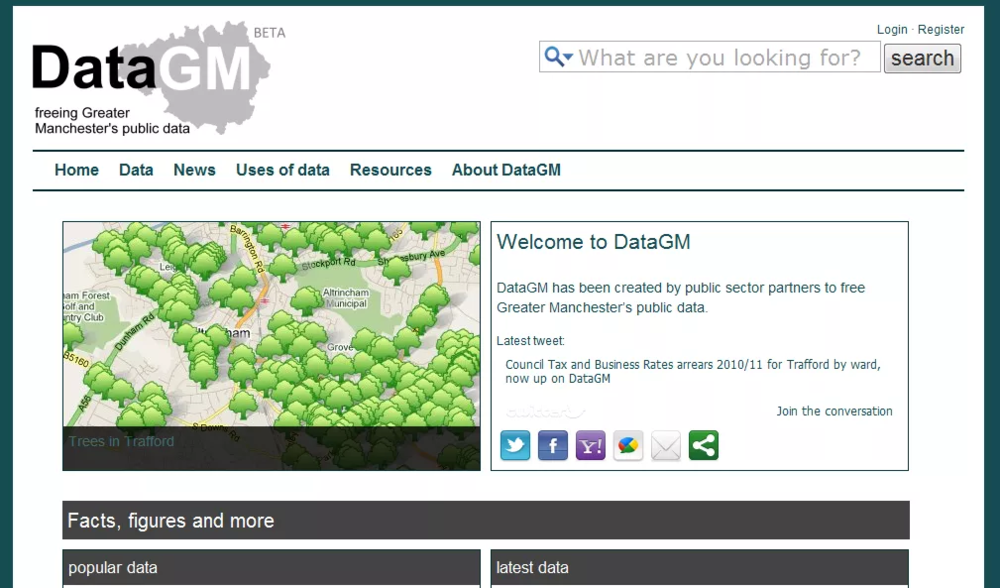
Who is interested in your data?
There are five main key categories of FOI requesters:
- journalists;
- MPs;
- campaign groups;
- researchers;
- private individuals.
However when it comes to open data, especially the raw format of data, the group of data consumers encompass businesses, app developers (see for example the Transport for London open data success story) and also journalists are increasingly learning data scientist and data mining skills. Open data also helps engage with these wider audiences, while at the same time addresses the pain of FOI, enables colleagues to access and reuse the data internally, resulting in more transparency and operational efficiency among others.
The moral of this blog post:
Opening up data, in smart ways through online data portals does ease the pain of FOI, enables collaboration across the organisation and the wider community and has the potential to save your organisation 10’s and 100’s of thousands of £ annually. Is open data the death of FOI? In the short term probably not, however in the long term it has the potential to free up resources currently tied into responding to FOI requests and contribute to local, central and wider public sector organisational and business process transformation.
Unsure on how to get started on your open data journey?
Get in touch with us for a free one-to-one session on open data or sign up for a free USMART open data platform trial.
More
Unlocking Ireland's Data Potential: Navigating the Open Data Directive with UrbanTide
News

UrbanTide's Commitment to Security: Officially ISO 27001 Certified!
News

uZero was awarded the edie Net Zero Innovation of the Year: Software, Systems & Services Award
News

Tackling the growing fuel poverty crisis and supporting the Just Transition to net zero
News

Low Carbon Homes’ Home Upgrade Show: Innovations in Retrofit
News

Data Integration and Collaboration are critical for the future of Transportation: Insights from JCT Symposium
News

uMove to support Bedfordshire Council to achieve ambitious sustainability plans
News

Active travel, the current challenges and solutions
News

Using the power of data to build cities of tomorrow
News

uMove supports the Smart Manuals for Streets programme from DfT
News

Scotland's Cycling Framework Makes Infrastructure Greatest Priority
News

Reducing emissions and improving health with active travel
Cycling Scotland

Targeting energy-efficiency campaigns to households most in need
Greater South East Net Zero Hub

Protecting an aging population from fuel poverty
Dartford Borough Council and Dover District Council

Identifying households eligible for energy grant support
The Wise Group

Facilitating active travel behavioural change with data
SEStran

Helping identify customers in or at risk of fuel poverty.
UK Power Networks

Open data promotes transparency, builds trust and empower citizens
Ireland Open Data Training

Identifying and unlocking new revenue from business rates with AI
North Lanarkshire

Tackling the growing
fuel poverty crisis with data and AI
UKRI

Understanding how we live and use our homes with real-time energy data
Smartline

Managing the impact of noise pollution on our cities
Noiseability

Accelerating the transformation of the UK’s energy systems
Energy Systems Catapult

Creating an integrated, affordable low-carbon energy system of the future
ReFLEX Orkney

Investing in sustainable transport infrastructure to become carbon neutral
Somerset County Council

Identifying ageing households at risk of cold and damp home
Sunderland City Council

Innovate UK funding to help our Planet Centred approach to retrofitting Europe’s leakiest homes
News

Open data is now a legal requirement in Ireland and the EU
News

New ‘uZero’ Artificial Intelligence software could help millions with their fuel bills
News
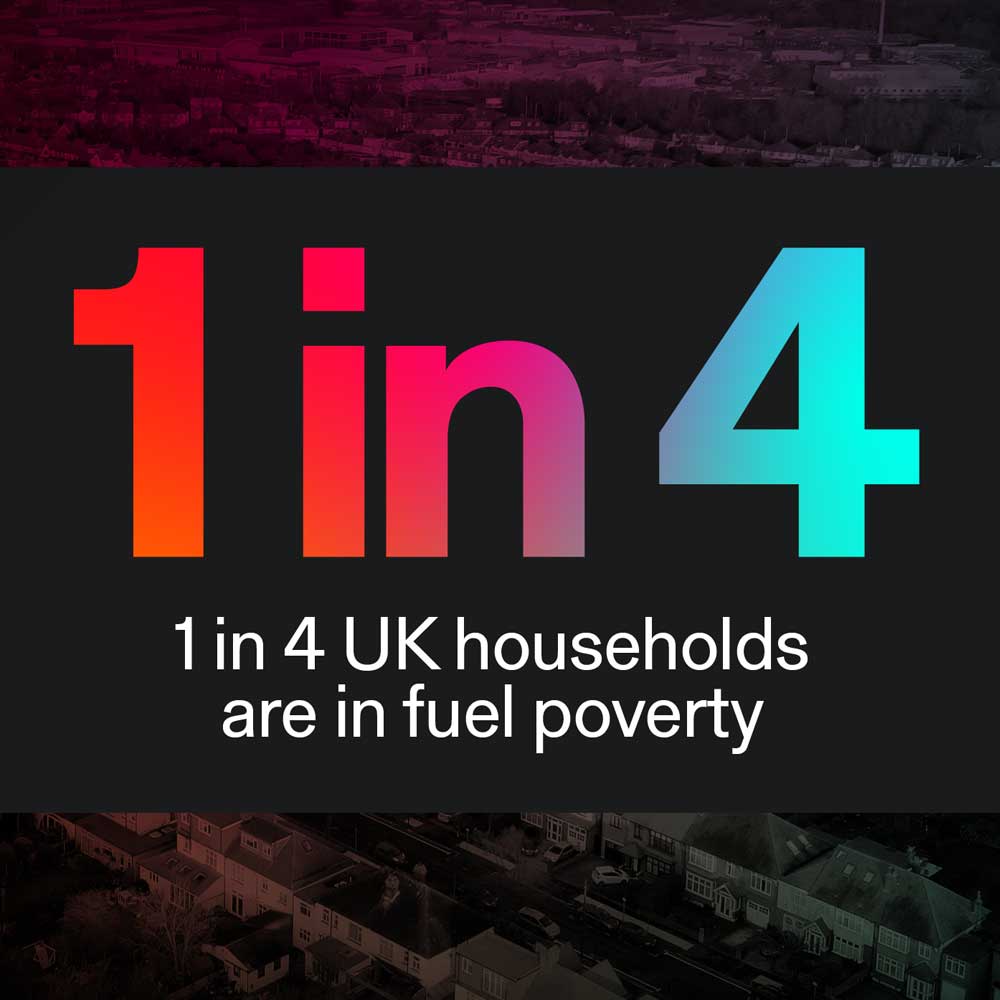
UrbanTide helps secure £48 million funding for Scottish Cities Alliance
News

UrbanTide leads £24 million program to make Glasgow a Future City
News

Building smart communities for OPEN Glasgow Engagement Programme
News

UrbanTide launches IoT data insights platform, uSmart
News
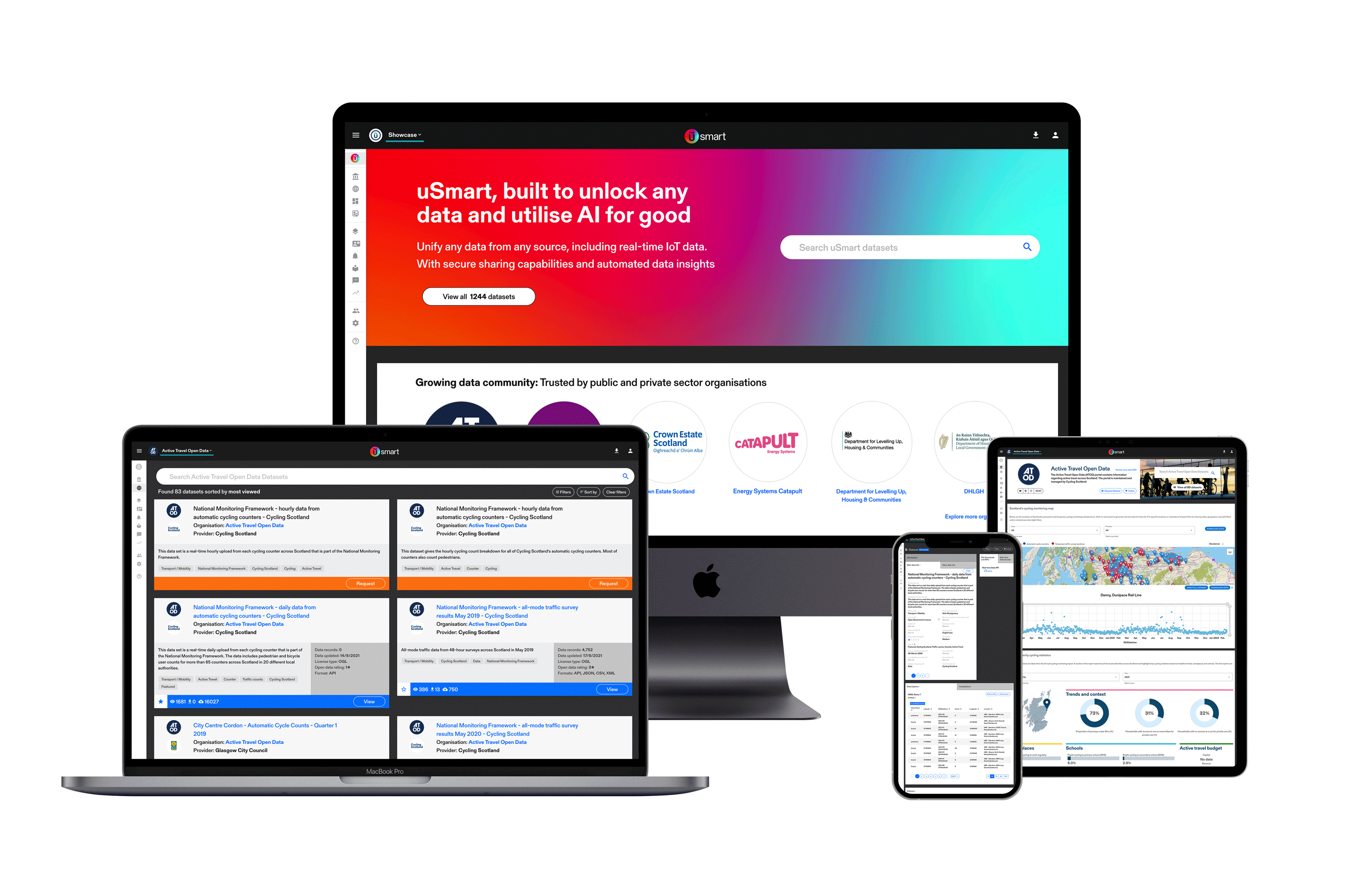
uZero announced as UKRI MEDA competition winner
News

Social Connect is a unique UK Power Networks (UKPN) innovation project
News

UrbanTide announces partnership with Energy Systems Catapult
News

UrbanTide marks four years of Open Data training in Ireland
News

Noisability: UrbanTide wins major bid as part of SynchroniCity program
News

UrbanTide joins prestigious Artificial Intelligence accelerator
News

UrbanTide recognised at ScotlandIS Digital Technology Awards
News

ODI publishes case studies that show how open data can be used in service redesign
News

UrbanTide teams up with North Lanarkshire Council to make better services with data
News

UrbanTide, Snook and North Lanarkshire Council announced as finalists for the 2018 Digital Technology Awards
News

Innovative smart communities IoT project powered by USMART
News
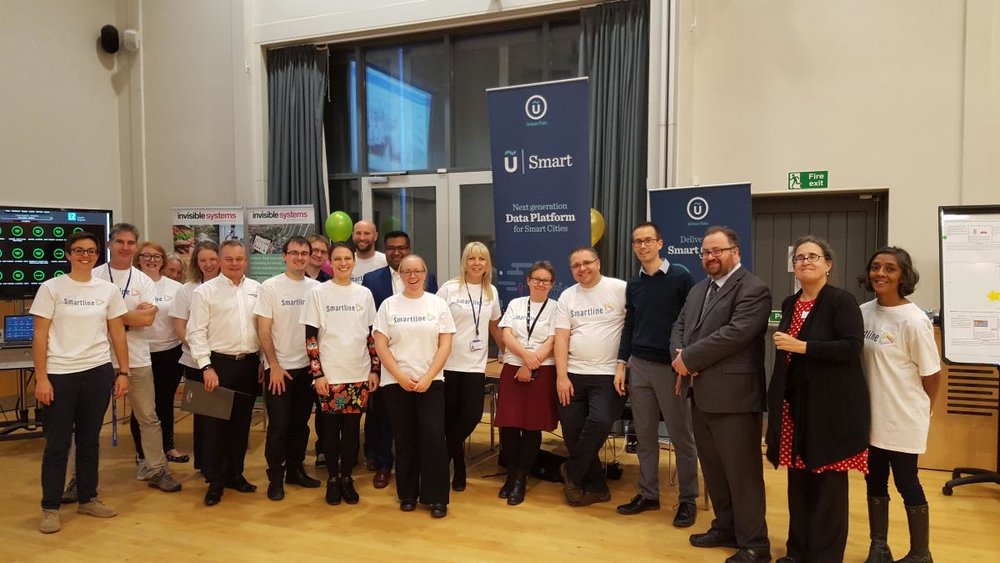
The Power of Data Science in the Health and Care Sector
News

UrbanTide to help transform Ireland by unlocking the power of open data
News

Stay ahead of the curve by learning more about these new smart cities standards
News

#DataFest17 - 12 key lessons we learned about smart cities, communities and the future of data
News
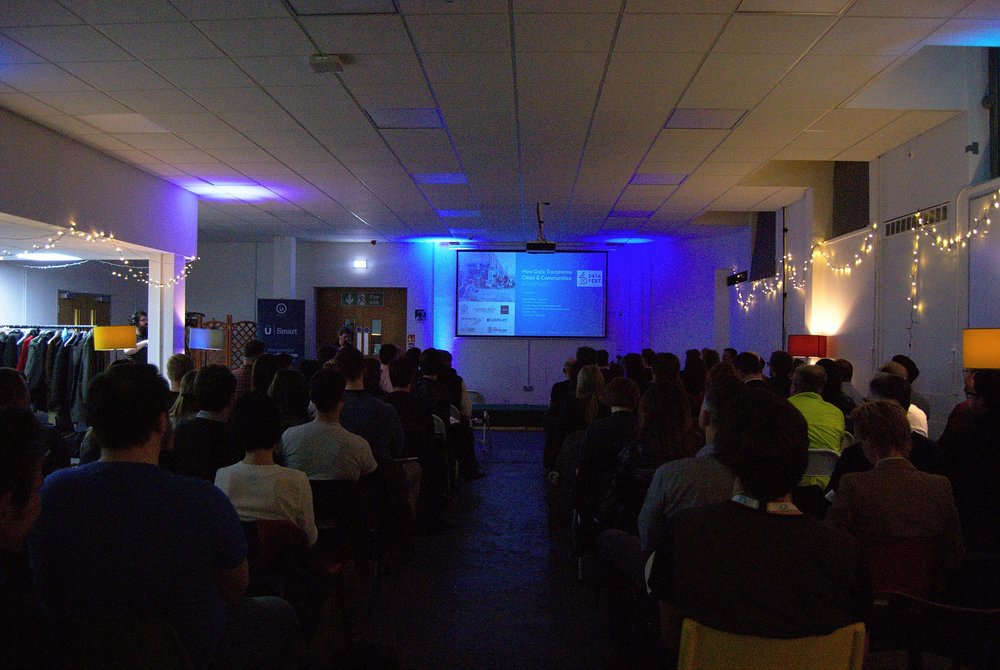
Emerging ideas for a renewed (Y)Our Glasgow City Centre
News

Future Health Hack - building the future of healthcare one line of code at a time
News
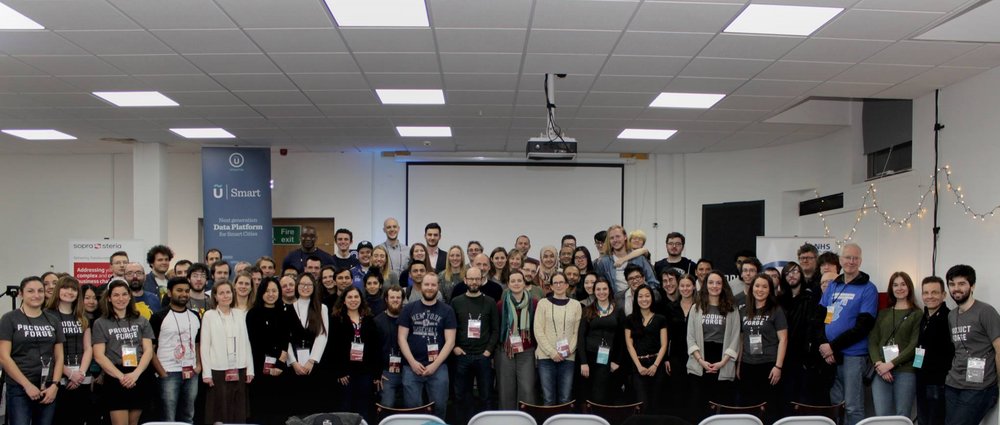
Meet our API Data Explorer – aka your new best friend if you are working with big data
News

Car parks ‘extinct’ in smart cities of the future?
News

3 awesome USMART features - with more coming soon!
News

Data scientists and USMART: a match made in heaven
News

We are now Regional Supporters of Open Data Impact Map
News

Next generation open data platform looking for beta testers!
News

Glasgow city centre regeneration - how smart can Glasgow be?
News

Open data - is the open private sector the next frontier?
News

Open data everywhere! Review of open data maturity in Europe, UK and Scotland
News

Feedback from our year delivering open data training for Scottish Government
News

Announcing our new open data training programme
News

Glasgow City Centre District Regeneration Frameworks
News

Metadata and metadata standards- reflections from our Chief Operational Officer
News

All about our Smart Cities Maturity Self-Assessment Tool
News

Open data training for Scotland's public sector
News

Engage - invest – Exploit (EiE) or Enjoyable - interactive - Experience (EiE)
News

UrbanTide and India: 5 Lesson's Learned from Simon's Trip to the Subcontinent
News

Cisco and the Smart Cities Council: 4 Messages from America...
News

Edinburgh continues to iterate, and then iterate again
News

Start your journey
Take a look at our product page to find out which UrbanTide AI tool has been designed for your needs.
Find out how we can support your data and AI projects and see our growing AI portfolio in action.












